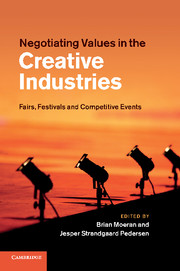Book contents
- Frontmatter
- Contents
- Figures
- Tables
- Contributors
- Acknowledgements
- Introduction
- 1 A Salon’s life
- 2 Art fairs
- 3 Biennalization and its discontents
- 4 Staging auctions
- 5 The book fair as a tournament of values
- 6 Inventing universal television
- 7 Transforming film product identities
- 8 Event institutionalization and maintenance
- 9 Tradition and transformation at the Fan Fair festival
- 10 Between art and commerce
- 11 Configuring sustainability at fashion week
- 12 An inconvenient truce
- 13 The retrospective use of tournament rituals in field configuration
- Afterword Converting values into other values
- Author index
- Subject index
- References
11 - Configuring sustainability at fashion week
Published online by Cambridge University Press: 25 October 2011
- Frontmatter
- Contents
- Figures
- Tables
- Contributors
- Acknowledgements
- Introduction
- 1 A Salon’s life
- 2 Art fairs
- 3 Biennalization and its discontents
- 4 Staging auctions
- 5 The book fair as a tournament of values
- 6 Inventing universal television
- 7 Transforming film product identities
- 8 Event institutionalization and maintenance
- 9 Tradition and transformation at the Fan Fair festival
- 10 Between art and commerce
- 11 Configuring sustainability at fashion week
- 12 An inconvenient truce
- 13 The retrospective use of tournament rituals in field configuration
- Afterword Converting values into other values
- Author index
- Subject index
- References
Summary
In recent years, the principle of sustainability has presented itself as a challenge to the global economic system in general (Jackson, 2009), and to the fashion industry in particular. At first sight, what Orvar Löfgren (2005) has called its ‘catwalk economy’ – the systematic launching of new collections in the framework of biannual fashion weeks – seems to clash with the long-term orientation of sustainability, as expressed in the United Nations (UN) definition of sustainable development as ‘development that meets the needs of the present without compromising the ability of future generations to meet their own needs’.
Even so, the value ascribed to sustainability signifies an ethical turn in business, which has foregrounded the responsibility to address problems related to climate and environment, as well as labour, animal welfare and corporate philanthropy. In association with terms such as organic, eco, green, fair trade and, in company strategy, corporate social responsibility and codes of conduct, sustainability is a figure that is vague enough to gloss over big varieties in definition, stakeholder interest and involvement, and at the same time powerful enough to draw the commitment of many different actors, including consumers, companies and (inter)national organizations. As such we use it as the heading for a new collective value orientation.
- Type
- Chapter
- Information
- Negotiating Values in the Creative IndustriesFairs, Festivals and Competitive Events, pp. 270 - 293Publisher: Cambridge University PressPrint publication year: 2011
References
- 5
- Cited by



